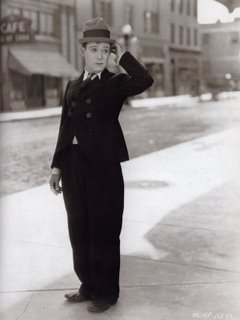Harry Langdon

"The oddest thing about this whole funny business is that the public really wants to laugh, but it's the hardest thing in the world to make them do it." -- Harry Langdon.
The unlikeliest of silent comedians, the oldest of the four worthies (Chaplin, Keaton and Lloyd being the others), the last to reach the movie screen, and, according to Mack Sennett, the greatest of them all. Born on this day in 1884 in Council Bluff, Iowa to Salvation Army parents, he left home at 13 to join a medicine show. By 1906, while working the vaudeville circuit he had created the rough edges of the character which would see him through his brief but brilliant turn as a silent movie comedian: sleepy, child-like mannerisms, baggy trousers, a round hat with a punched-in crown, and a white pancake face with eyes, eyebrows and lips darkly outlined, reducing his facial features to a few cartoon-like smudges.
As vaudeville began to vanish, Langdon was plucked out of the circuit and signed by Sennett to a star contract. Initially, Sennett didn't know what to do with Langdon: most Sennett comedians ran very fast and had a certain natural malevolence -- they'd think nothing of tripping the cop, or throwing a brick at him. The principle behind Langdon's blinking "baby-man" character was entirely the opposite: he functioned more as a comic pause in the action, the ridiculous calm at the eye of the tornado of slapstick around him. And throwing a brick was out of the question: Langdon was the child of fate, and if fate would somehow see fit to drop a brick on the cop's head, then Langdon would make it home safely.
Sennett entrusted Langdon's offbeat brand of pantomime to a young writer, Frank Capra, who helped Langdon figure out how to make his character work on celluloid in Langdon's three best feature films: The Strong Man (1926), Tramp, Tramp, Tramp (1926, with Joan Crawford) and Long Pants (1927).
Langdon's fame quickly faded as the silent era drew to a close, although he continued to work as a character actor and gag writer for Laurel and Hardy, once even subbing for Laurel opposite Hardy in Zenobia (1939) when Laurel left the studio during a contract dispute. He died on December 22, 1944 of a cerebral hemorrhage while on a movie set.
Labels: Silent Film





1 Comments:
Thanks much for this. You know the kind of history I like!
Post a Comment
Subscribe to Post Comments [Atom]
<< Home